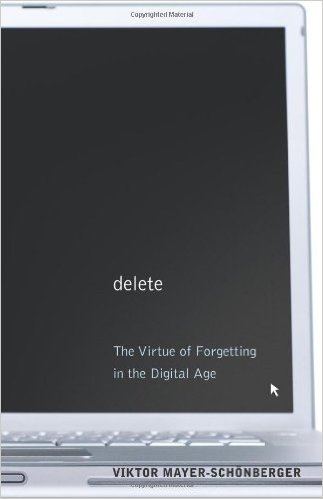
Professor Viktor Mayer-Schönberger
Professor of Internet Governance and Regulation
Viktor Mayer-Schönberger is the OII's Professor of Internet Governance and Regulation. His research focuses on the role of information in a networked economy.

Mayer-Schönberger, V. (2009) Delete: The Virtue of Forgetting in the Digital Age. Princeton University Press. Cloth, $24.95 / £16.95, 256 pp., 5 1/2 x 8 1/2. ISBN: 978-0691138619.
Mayer-Schönberger, V. (2010) Delete. Die Tugend des Vergessens in digitalen Zeiten. Berlin University Press. ISBN 978-3-940432-90-2.
Delete looks at the surprising phenomenon of perfect remembering in the digital age, and reveals why we must reintroduce our capacity to forget. Digital technology empowers us as never before, yet it has unforeseen consequences as well. Potentially humiliating content on Facebook is enshrined in cyberspace for future employers to see. Google remembers everything we’ve searched for and when. The digital realm remembers what is sometimes better forgotten: this has profound implications for us all.
In Delete, Viktor Mayer-Schönberger traces the important role that forgetting has played throughout human history, from the ability to make sound decisions unencumbered by the past to the possibility of second chances. The written word made it possible for humans to remember across generations and time, yet now digital technology and global networks are overriding our natural ability to forget — the past is ever present, ready to be called up at the click of a mouse.
Mayer-Schönberger examines the technology that’s facilitating the end of forgetting — digitization, cheap storage and easy retrieval, global access, and increasingly powerful software — and describes the dangers of everlasting digital memory, whether it’s outdated information taken out of context or compromising photos the Web won’t let us forget. He explains why information privacy rights and other fixes can’t help us, and proposes an ingeniously simple solution — expiration dates on information — that may.
Delete is an eye-opening book that will help us remember how to forget in the digital age.
Viktor Mayer-Schönberger is the OII’s Professor of Internet Governance and Regulation. His research focuses on the role of information in a networked economy. He was previously Associate Professor at the Lee Kuan Yew School of Public Policy and Director of the Information + Innovation Policy Research Centre. Before coming to the LKYSPP he spent ten years on the faculty of Harvard’s Kennedy School of Government.
“Mayer-Schonberger deserves to be applauded and Delete deserves to be read for making us aware of the timelessness of what we created and for getting us to consider what endless accumulation might portend.” — Paul Duguid, Times Literary Supplement
“In Delete, Viktor Mayer-Schönberger argues that we should be less troubled by the fleetingness of our digital records than by the way they can linger.” — Adam Keiper, Wall Street Journal
“There is no better source for fostering an informed debate on this issue.” — Science
“As its title suggests, Delete is about forgetting, more specifically about the demise of forgetting and the resulting perils. … [Mayer-Schoenberger] comes up with an interesting solution: expiration dates in electronic files. This would stop the files from existing forever and flooding us and the next generations with gigantic piles of mostly useless or even potentially harmful details. This proposal should not be forgotten as we navigate between the urge to record and immortalise our lives and the need to stay productive and sane.” — Yadin Dudai, New Scientist
“Mayer-Schönberger raises questions about the power of technology and how it affects our interpretation of time. . . . He draws on a rich body of contemporary psychological theory to argue that both individuals and societies are obliged to rewrite or eliminate elements of the past that would render action in the present impossible.” — Fred Turner, Nature
“After a decade or more of books examining digital technology’s consequences for the law, politics and society, we are finally beginning to see interesting books that talk about its effect on the individual. Delete is a highly promising (and often fascinating) first effort to spell out the problems, and to think through how they might be engaged.” — Henry Farrell, Times Higher Education